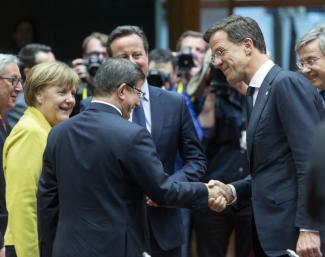European Op-Ed views
Realpolitik without enthusiasm

Il Sole 24 ore, Milan
The European quota of 72,000 means that daily arrivals need to be reduced from 1,100 now and 2,000 just two months ago to merely 200. That will be Turkey’s job. For the deal not to collapse, Turkey must control 2,600 kilometres of Aegean coastline with the 40 coast guard vessels it currently has. Doing so will be practically impossible, unless refugees are kept from reaching the coast altogether and Turkish repression becomes a worse nightmare than the civil war they are escaping. Measured against the inflow of 144,000 persons since the beginning of the year, the European quota is underwhelming. (…) While becoming the policeman of Europe’s front doors, Turkey does not get the keys – but it is trying to get closer to them. If the country complies with 72 requirements, its citizens will be rewarded with visa liberalisation by the end of June. Moreover, Turkey gets the – albeit symbolical – restart of accession talks. And let’s not forget the doubling from € 3 to 6 billion of European financial aid, if the first tranche is spent well. Europeans secretly bet that Ankara will fail in its rush towards visa-freedom, which is something very few EU members, and especially France, want to offer. Cyprus, moreover, is always ready to veto Turkey’s joining the Union. But the agreement was and is an urgent need for Merkel and all of Europe, which otherwise risks the end of the Schengen agreement (which abolished border controls among most EU member states, D+C). The agreement is equally needed by Turkey. In view of the Syrian crisis and its broken relations with Russia, the government had to escape political isolation. So let’s give it a try. Realpolitik has won – but without enthusiasm.
Frankfurter Allgemeine Zeitung
It was the right decision to put the EU’s refugee agreement with Turkey in force fast. Had one waited weeks after concluding the deal on Friday, refugee numbers would most likely have surged once more. Many migrants would have tried to grasp the supposedly last chance of reaching Greece. The open door to the European Union has thus been closed since Sunday – at least, that is the intention. (…) The agreement with Turkey is not entirely satisfying in terms of politics, law or ethics. However, it is the best way the EU has found so far to tackle the totally unacceptable situation on its southern external border and move towards a goal that (almost) all want to achieve: reducing the influx. It is said that the chancellor’s many adversaries in Germany and abroad want that. Anyone serious about the matter will wait and see how far Merkel’s plan, which at least managed to reunite Europe somewhat, will take us.
Frankfurter Rundschau
Erdogan wants to establish a presidential sultanate in Turkey; he might exploit this foreign policy success on visas by holding early elections and pushing through the constitutional change he wants. One would probably speak of collateral damage in regard to the freedom of the press, human rights and Erdogan’s stance towards Kurds. Another aspect of the visa matter is that Turkey is suddenly closer to the borderless Schengen area. (…) That will not make it any easier to protect Europe’s external borders.
Het Financieele Dagblad, Amsterdam
Let’s hope that the deal with Turkey works out. There are still many obstacles to implementation. First of all, there is a logistical issue. Greece has to set up – from scratch, but within two weeks – an enormous infrastructure for receiving and interviewing migrants and assessing their asylum chances. There is reason to doubt that a country that is not exactly known for effective administration will succeed in doing so. There is also reason to doubt that the new agreement will really discourage migrants. As usual, ramshackle boats arrived from Turkey on Greek shores on Sunday. Migrants might take other roots, moreover, and the EU should take that into account. Last weekend, Italy’s coast guard once more had to save hundreds of refugees who attempted to cross over to Europe from north Africa. There are routes via Ukraine, or even Russia. Perhaps the EU will have to negotiate with dubious regimes again.
El Pais, Madrid
What we are witnessing in Europe now rhymes with a past that was quite bitter for Spaniards. The smiles of Merkel, Cameron and Hollande bring to mind the smile of British Prime Minister Chamberlain and the false tears of French Socialist Léon Blum. (…) International law is being twisted to bypass asylum agreements, with the pretence of everything adding up to perfectly democratic measures in pursuit of the common good. (…) In 1936, the threat of war made the democratic forces leave Spain’s democrats to their fate and later detain half a million political refugees behind fences on beaches under the open sky. History tells us that this shame did not prevent World War II; it actually boosted the confidence of the fascist regimes. The agreement with Turkey looks likely to cause more damage than good in the same way.
Financial Times, London
The EU not only sold its soul that day, it actually negotiated a pretty lousy deal. (…) The agreement with Turkey will also have an impact on the UK referendum debate. Would the camp in favour of leaving the EU not have something to say about visa-free travel for 75 million Turks? Anyone who cares about democracy and human rights will hate this deal. So will anyone who fears German dominance of the EU, since it was initiated by Angela Merkel.
The Guardian, London
It needs to be said, not least because in too many countries it is not being said clearly or at all, that the people who matter most in a refugee crisis are the refugees themselves. That is why, despite its other political and social dimensions, the deal struck on Friday in Brussels between the European Union and Turkey must be primarily judged by how it treats the refugees who are the human victims at the heart of the tragedy. These people have in very many cases been bombed out of their homes, been forced to leave their families and countries at gunpoint, been callously exploited by cruel people smugglers, have faced death in the snows and on the seas, and have been first welcomed and then rebuffed by successive national authorities. The refugees’ presence and numbers, swelled by economic migrants from beyond Syria, provide a physical and social challenge, none of which should be underestimated. Governments need to be able to show they have a grip, which they manifestly have failed to show in the Syrian crisis. This deal (and the coincidental capture of the Paris terror suspect on Friday) may change that. In the end, however, the moral issue is clear: the world has the responsibility to treat these suffering people decently. Friday’s deal may potentially fulfil that responsibility. (…) But the real test will be in the implementation. That will demand resources and the readiness of all the signatories to play their part humanely and cooperatively according to the rules. The practicalities are daunting.










